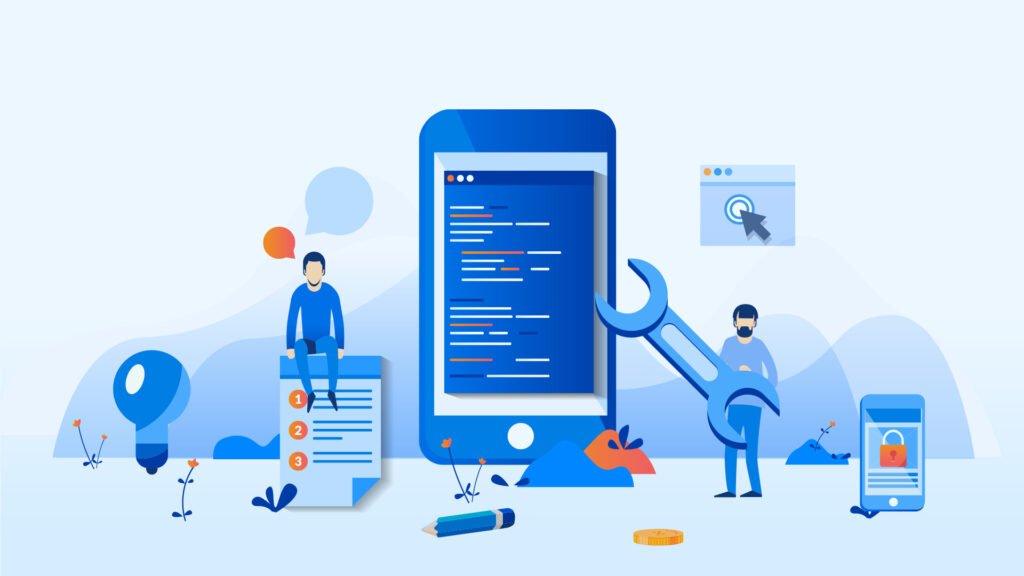Introduction
Overview of Mobile App Development
Mobile app development company has transformed the digital landscape, offering users unprecedented access to services, entertainment, and information. As smartphones have become ubiquitous, mobile apps have emerged as essential tools for daily life, from banking and shopping to social networking and entertainment.
Importance of Mobile Apps in Today’s World
In today’s fast-paced world, mobile apps are not just a luxury but a necessity. They provide convenience, connectivity, and efficiency, enabling users to perform tasks on the go. Businesses leverage mobile apps to reach customers, streamline operations, and enhance user engagement. The global mobile app market continues to grow, with millions of apps available across various platforms.
Role of Mobile App Development Companies
Mobile app development company play a crucial role in bringing innovative app ideas to life. They provide expertise in design, development, and deployment, ensuring that apps meet user needs and market demands. These companies offer a range of services, from consulting and strategy to full-cycle app development and maintenance.
History and Evolution
Early Days of Mobile Apps
The history of mobile apps dates back to the late 1990s when basic applications like calculators and games were first introduced on mobile devices. The launch of Apple’s App Store in 2008 marked a significant turning point, creating a new marketplace for mobile applications.
Key Milestones in Mobile App Development
Over the years, several milestones have shaped the mobile app industry. The rise of Android, the introduction of in-app purchases, and the development of cloud-based apps have revolutionized how apps are created and used. The proliferation of smartphones and tablets has further accelerated app adoption.
Evolution of Mobile App Development Companies
As the demand for mobile apps has grown, so has the number of companies specializing in app development. These companies have evolved from small startups to large enterprises, offering a wide range of services and technologies. Today, they play a pivotal role in the tech ecosystem, driving innovation and digital transformation.
Types of Mobile Apps
Native Apps
Native apps are built specifically for a particular operating system, such as iOS or Android. They offer high performance and a seamless user experience, as they are optimized for the device’s hardware and software.
Web Apps
Web apps are accessed through a web browser and do not require installation. They are built using web technologies like HTML, CSS, and JavaScript. While they are platform-independent, they may lack the functionality and performance of native apps.
Hybrid Apps
Hybrid apps combine elements of both native and web apps. They are built using web technologies but wrapped in a native container, allowing them to be distributed through app stores. This approach offers a balance between cost and performance.
Progressive Web Apps (PWAs)
PWAs are web applications that offer a native-like experience. They are fast, reliable, and can work offline. PWAs are designed to be responsive and can be accessed on any device, making them a versatile option for businesses.
Mobile App Development Process
Ideation and Conceptualization
The first step in app development is ideation, where the concept and goals of the app are defined. This phase involves brainstorming ideas, conducting market research, and identifying the target audience.
Design and Prototyping
In this phase, the app’s design and user interface are created. Wireframes and prototypes are developed to visualize the app’s layout and functionality. This stage is crucial for ensuring a user-friendly and visually appealing design.
Development and Coding
The development phase involves coding the app’s front-end and back-end. Developers use programming languages and frameworks to build the app’s features and functionality. This stage requires close collaboration between developers and designers.
Testing and Quality Assurance
Before launch, the app undergoes rigorous testing to identify and fix bugs. Quality assurance ensures that the app performs well across different devices and operating systems. Testing also includes usability and security checks.
Deployment and Launch
Once the app is tested and approved, it is deployed to app stores or distributed through other channels. The launch phase includes marketing and promotional activities to attract users. Post-launch, the app may require updates and maintenance.
Technologies Used in Mobile App Development
Programming Languages
Popular programming languages for mobile app development include Swift for iOS, Kotlin for Android, and JavaScript for cross-platform apps. These languages offer various features and capabilities for building robust and efficient apps.
Frameworks and Tools
Frameworks like React Native and Flutter enable developers to create cross-platform apps with a single codebase. Other tools, such as Xamarin and Ionic, also facilitate cross-platform development.
Backend Technologies
Backend technologies like Node.js, Django, and Ruby on Rails handle server-side logic and database management. They provide APIs and services that support app functionality and data storage.
Cloud Services and Databases
Cloud services like AWS, Firebase, and Azure offer scalable infrastructure for app hosting and data management. Databases like MongoDB, MySQL, and PostgreSQL store and manage app data.
Key Features of Successful Mobile Apps
User Experience (UX) Design
A well-designed UX is critical for app success. It ensures that the app is intuitive, easy to navigate, and visually appealing. Good UX design increases user satisfaction and retention.
Performance and Speed
Performance is a key factor in user satisfaction. Apps must load quickly and run smoothly, even under heavy usage. Optimization techniques, such as caching and minimizing API calls, enhance app performance.
Security and Data Privacy
Security is paramount in mobile app development. Apps must protect user data and prevent unauthorized access. Developers implement encryption, secure authentication, and data protection measures to safeguard user information.
Scalability and Flexibility
Successful apps are scalable and flexible, capable of handling growth and changing requirements. Scalable architecture and modular design enable apps to adapt to new features and technologies.
Choosing a Mobile App Development Company
Factors to Consider
When selecting a mobile app development company, consider factors like experience, portfolio, and expertise. Look for a company with a proven track record and a diverse portfolio of successful projects.
Questions to Ask Potential Developers
Ask potential developers about their development process, team structure, and experience with similar projects. Inquire about their approach to design, testing, and post-launch support.
Cost and Budget Considerations
Budget is a critical factor in app development. Determine your budget and ask for a detailed cost breakdown from the development company. Be clear about your expectations and any additional costs.
Challenges in Mobile App Development
Platform Fragmentation
With numerous devices and operating systems, platform fragmentation poses a challenge in app development. Developers must ensure that the app works seamlessly across different platforms and devices.
Security Concerns
Security is a major concern in mobile app development. Apps must protect against data breaches, malware, and other security threats. Developers must implement robust security measures and stay updated with the latest security practices.
User Retention and Engagement
Keeping users engaged and retaining them is a challenge. Developers must focus on creating engaging content, personalized experiences, and regular updates to keep users interested.
Future Trends in Mobile App Development
Artificial Intelligence and Machine Learning
AI and machine learning are transforming mobile app development. They enable features like personalized recommendations, voice recognition, and predictive analytics. AI-powered apps offer enhanced user experiences and data-driven insights.
Augmented Reality (AR) and Virtual Reality (VR)
AR and VR technologies are revolutionizing various industries, including gaming, retail, and education. These technologies offer immersive experiences, enhancing user engagement and interaction.
Internet of Things (IoT) Integration
IoT integration enables apps to connect with smart devices, creating a connected ecosystem. IoT apps can control devices, monitor data, and automate tasks, offering convenience and efficiency.
5G Technology and Its Impact
The advent of 5G technology is set to revolutionize mobile app development. With faster speeds and lower latency, 5G enables more complex and data-intensive apps, such as real-time gaming and high-definition streaming.
Case Studies
Successful Mobile App Development Stories
Several mobile apps have achieved tremendous success, thanks to innovative ideas and effective development strategies. Case studies of successful apps provide valuable insights into what works and what doesn’t.
Lessons Learned from Failed Projects
Analyzing failed projects can offer important lessons. Understanding the reasons for failure, such as poor user experience, lack of market research, or technical issues, can help avoid similar mistakes.
Industry Insights
Expert Opinions and Predictions
Industry experts provide valuable insights and predictions about the future of mobile app development. Their perspectives can guide businesses in making informed decisions and staying ahead of the curve.
Impact of Mobile Apps on Various Industries
Mobile apps have a profound impact on various industries, including healthcare, finance, retail, and entertainment. They offer new ways to engage customers, streamline operations, and deliver services.
FAQs
Q: How long does it take to develop a mobile app?
A: The time required to develop a mobile app varies depending on the complexity and features. On average, it can take anywhere from a few months to over a year.
Q: What is the average cost of developing a mobile app?
A: The cost of developing a mobile app depends on factors like complexity, platform, and features. Costs can range from a few thousand dollars to several hundred thousand dollars.
Q: How do I start a mobile app development project?
A: To start a mobile app development project, define your idea, set goals, and create a detailed plan. Choose a development company with the expertise to bring your vision to life.
Conclusion
Recap of Key Points
Mobile app development company is a dynamic and evolving field, offering endless opportunities for innovation. From ideation to deployment, each stage of development requires careful planning and execution.
Future Outlook and Opportunities
The future of mobile app development is bright, with emerging technologies like AI, AR, VR, and 5G paving the way for new possibilities. Businesses and developers must stay updated with the latest trends and technologies to remain competitive.
Call to Action for Further Engagement
Ready to develop your mobile app? Contact a reputable mobile app development company to discuss your project and bring your vision to life. Stay informed, explore new ideas, and leverage the power of mobile apps to drive your business forward.





hgh 4iu per day results bodybuilding
References:
hgh and testosterone cycle results (ayers-frederiksen.federatedjournals.com)
saizen hgh bodybuilding
References:
does Hgh raise Testosterone
winstrol steroid side effects
References:
best steroid for fat loss [https://git.haowumc.com/]
bulking supplements bodybuilding
References:
best steroids for weight loss [panoptikon.org]